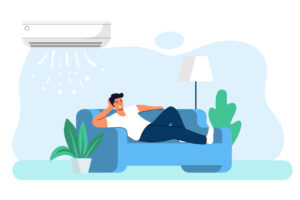As the summer season begins in North Augusta, Georgia, the humidity levels rise with the outdoor temperatures. Dealing with humidity outside is challenging enough, but when the moisture rises in your home, it can be unbearable and uncomfortable. Understanding the importance of managing indoor humidity and ideal moisture levels can help protect your home this summer.
Ideal Humidity Level
The ideal humidity level in your home depends on a few factors. These include your physical activity level, how much clothing you typically wear at home, and your own personal preferences. When the moisture levels are too high, the air feels sticky, muggy, and heavy. Finding the right balance will ensure home comfort, along with a decreased risk of certain issues that can come with too much moisture.
Excess moisture often leads to biological growth, which can make you and your family sick. You may also notice that high humidity causes issues with your electronic devices, warps wood floors or furniture, and increases the risk of bacterial growth. Humidity levels that are too low create issues including dry, itchy skin and an increased risk of infection and colds. Those who suffer from asthma or allergies may notice their symptoms worsen. Humid air makes it harder to achieve a comfortably cool indoor temperature, resulting in the need to run the air conditioner more frequently, which increases your bills.
Discomfort in the Home
It’s hard to fall and stay asleep when you’re feeling uncomfortably warm and sticky. One of the best ways to manage indoor humidity is to use your central air conditioning system, which has built-in moisture sensors and can remove humidity from the air as it circulates throughout the rooms of the home. If your system isn’t properly removing moisture, you may need to add a dehumidifier during the summer months. This unit is designed to work with your HVAC system for whole-home dehumidifying.
It’s also helpful to use exhaust fans when you’re cooking or producing a lot of steam while showering or bathing. These fans should vent to the outside for maximum efficiency. Doing so can lessen the humidity in the air, as well as reduce the risk of potential damage to the drywall and flooring in your kitchen and bathrooms.
Caring for Your Home
In order to keep your air conditioning system operating smoothly, you should keep up with regular maintenance. During a tuneup, an HVAC service technician checks all the components of your unit, as well as tests the airflow and temperature control. If anything isn’t working correctly, the technician can perform repairs right away before you hit the warmest part of the year. Without routine maintenance, your air conditioning system may not be able to keep up during the summer months, leading to increased moisture levels.
As an air conditioner reaches the end of its lifespan, its efficiency may start to drop as well. As a result, the unit may not be able to manage indoor humidity like it did in the past. Upgrading the AC system is a solution that can resolve the excess moisture issues, as well as provide more efficient heating and cooling throughout the changing seasons.
If you’re struggling to keep the indoor humidity levels under control in your home, our experienced HVAC technicians at Doc Savage can provide solutions. Contact us today at (706) 793-4131.
Image provided by Bigstock



